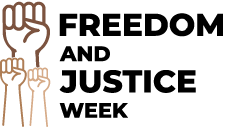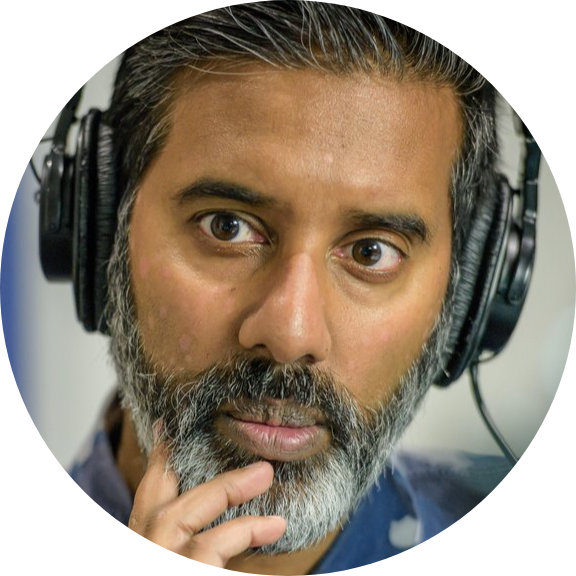
This article is part of our Freedom and Justice Week series – as Global Dashboard provides a platform for a diversity of voices to explore how we respond to the wave of protests that followed the murder of George Floyd. Read all the articles in the series here.
On the 2nd of June 2020 at approximately 1.08pm GMT, I broke down whilst presenting my BBC radio show.
[UK readers can listen here, from 6 minutes in. Or read our transcript.]
Hundreds of thousands of listeners were left without a broadcaster as I struggled to compose myself and the sound of me inhaling and exhaling filled the airwaves whilst I tried to find the words to carry on.
I was lucky because I could breathe, but I could not articulate the overwhelming sadness that stopped me in my tracks and led to me being momentarily incapable of speaking. I had just reminded my audience of the savage beating of Rodney King by the Los Angeles Police Department that had taken place 29 years before and as I tried to express my frustration at the fact that history was repeating itself, a tsunami of frustration, anger, and – I say it again – sadness, engulfed me.
When I eventually gathered my thoughts, the only words I could utter were “I am so sick of this.” What would it take for this no longer to be seen as a US problem, a black problem, a ghetto problem, a problem for the poor? The killing of George Floyd became a problem for all of us. Filmed from multiple angles on state-of-the-art cell phones, it was the superfast Wi-Fi version of that grainy home video footage that exposed the brutality of the LAPD to the world back in 1991.
“I am so sick of this”
The words “I can’t breathe” were relatable, universal. The callousness of the police to Mr Floyd’s pleas for mercy were on global display. People from all backgrounds, cultures, and classes felt sick to their stomachs. Worn down by lockdowns, economic uncertainty, and the unsettling nature of the pandemic, our frustrations found a focal point of injustice to focus on, a reason to come out – against government advice – onto the streets.
For many young people who had grown up on a diet of black sporting and musical icons, George Floyd was not an “other.” His pain was their pain, and their sense of injustice was amplified and shared around the world at a scale far beyond the flurries of outrage that lead to someone being “cancelled” online for a minor cultural indiscretion.
So, here we are again, broken but not defeated, exhausted but not uncaring. Another act of police brutality before the courts, and another round of hand wringing and soul searching from the powers that be acknowledging the roots of the crisis, and yet honing in on the minority who want to use this as an excuse to burn and loot.
And again, the Prime Minister has announced a cross-government commission to look into all aspects of racial inequality, saying that as a leader he cannot ignore the pleas of peaceful protestors. Yet this has been met with derision from some quarters, including the Shadow Justice Secretary and Labour Member of Parliament, David Lammy, who tweeted that there had been over 200 recommendations made in similar report over the years and asked the Prime Minister simply to implement them.
“What have you been doing all these years?”
But there is something different happening this time. The protests around the world and the interconnectedness of the young gives this moment an urgency. The impatience of youth has been transferred from frustration at the speed at which a video downloads to an angst that asks those of us who are older, “what have you been doing all these years?”
But what is effective protest? What gets results? There are those who believe that Black Lives Matter should not be allied to the political binary of Left or Right. For it to be allied to one ideological base – and to conflate its aims with an overthrow of the capitalist system – ensures its failure. To exclude potential allies, cancel people for honest mistakes, and show zero tolerance for those who scream “All Lives Matter!” is counterproductive. This is not a case for appeasement or surrender. What about empathy, and bridge building not burning?
Living in the United Kingdom, I am mindful that there are those who are terrified by the movement for a myriad of reasons. Some are plain racist and are never likely to change. Others were horrified by watching the 8 minutes and 46 seconds that George Floyd spent on the ground with a white police overseer kneeling on his neck. At that moment, there was a unity of revulsion. These potential allies may now feel alienated by the pockets of violence that have been reported by the media.
And there are those who have yet to fully understand the cumulative toll that societal racism takes on those who bear this burden. Yet they understand the difference between right and wrong. Right to protest for equality, but wrong to deface the statue of a British war hero. Correct to demand that the law is truly blind and doesn’t discriminate based on colour, gender, or sexuality, but criminal to attack police officers.
“We need to bring people together if we are to avoid flashpoints in the future”
The challenge is how you make people feel uncomfortable enough to act without alienating them into inaction, or even worse outright hostility to the cause. Despite what you might think, most people believe in fairness and equality. Harnessing this is key and the media has a role to play in not presenting this as a problem that can only be discussed in public forums by people of colour. A fear of saying the wrong thing can make the debate monocultural. This will not help.
Many want to see tangible change. The reports have been written, the statistics are stark, now what about policy? Housing, education, social care, family support, and investment in youth services should not be seen as the preserve of the Left or of Liberals. For those who think largely through an economic lens, the case for investment in each of these fields is clear. Helping people become citizens with a stake in their societies can yield no negative outcome that I can think of.
Another important conversation that should come out of the killing of George Floyd is the issue of segregated communities. Here in the UK, people live increasingly segregated lives. The valley that separates people then easily becomes a landfill into which hate and misinformation are dumped. For those who balk at the idea of social engineering, an attempt by politicians to compel people to mix will be anathema, but we need to bring people together if we are to avoid flashpoints in the future. It is too easy to compartmentalise a problem in a file marked “Their Problem” if you don’t have a meaningful relationship with the people who are covered by “their.”
If rage has nowhere to go, it will eventually dissipate or transfer to some other cause. This is the time for BLM leaders to tell people how to practically drive change through their economic and political engagement. Who are the corporations that benefit from the system being as it is? Who are the brands who advertise with media organisations that use division as their business model? How can we change the incentives of the politicians who form out laws, women and men whose electoral survival depends on their popularity at the ballot box?
A march is one thing, a campaign is something different. One is quickly over, the other requires a sustained attention span. And a plan.
We Are All George: Photo: Socialist Appeal, Flickr (CC BY 2.0)




